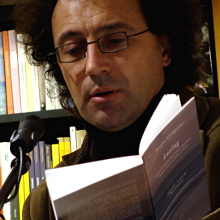What do you teach at Ca’ Foscari? What are your main research interests?
Marco Fazzini, born in 1962 in the Marche region. I teach English and Postcolonial Literature. In high school I was the best in maths, but despite my teachers' advice, I chose not to do engineering or computer science, but to enrol in Foreign Languages and Literature in Venice. A key factor was perhaps the fact that my English teacher, in my last year, while he was preparing an English-Italian dictionary for Mondadori, asked me to help him with some entries. I had already translated something at the time - I remember an "old" version of Kubla Khan - but it was the lyrics of some international singer-songwriters that initiated me into English: Leonard Cohen, Bob Dylan, Eric Andersen, Neil Young. Now, after so many years, I am still interested in things that I was already passionate about back then: translating, playing with the music of songs and poetry.
What are your professional role models / references?
They essentially come from my academic background, at least in the beginning: I did my first degree in Venice, with a dissertation in poetry with Prof. Pajalich, who, besides working on Postcolonial Literature, loved contemporary poetry. Then a Master of Arts at the University of Kwa-Zulu Natal, Durban (South Africa), when the main purpose of my stay in Durban was to translate poetry and meet the great poet Douglas Livingstone. Which I did, as well as making friends with other South Africans, including Stephen Gray, Patrick Cullinan, Chris Mann, John Coetzee, Stephen Watson, etc. Finally, thanks to my PhD (also in Venice) I began to take a "serious" interest in Scotland, after attending the Summer School of the University of Edinburgh, directed at the time by David Daiches.
Have you always known that this was going to be your path?
You are never certain of anything in life. It is true that after a year working in a company, I realised that I would never be an employee again... I had already written my first book, and I was waiting to leave for South Africa so... I considered it just a stepping stone. Many times, ideas become clear or take shape when someone bets on you, or encourages you. I was lucky to have teachers (or friends?) who always knew how to advise me and share. Sharing is something rare today, especially in certain circles. Soyinka gave us classes in our last year in Venice with enviable humility, a year before the Nobel; Douglas Livingstone, from South Africa, became not only a friend but a true "fan" of mine; Douglas Dunn, the well-known Scottish poet, wanted me at St. Andrews for a year, in his department. And then again: I exchanged correspondence with Seamus Heaney, Charles Tomlinson, Edwin Morgan, and Sorley Maclean for more than two decades. I owe my early research and my first books to them.
What has given you the greatest satisfaction in your career?
In general, I associate satisfaction not so much with awards or promotions, but with people I have come into contact with, including my students. They are also teaching you something every day, and to "rightly" and "honestly" step into the role of a teacher is a long way towards clarity in what you do and how you propose it. Feeling part of a group has always fascinated me, whatever "group" means (in literary circles, a class, a PRIN - Research Project of National Relevance), even though the world is moving towards individualism and narcissism. I receive, with some frequency, emails or letters from my former students reminding me of how one of my courses, or a poet, changed their lives. Stepping into the realm and privacy of people's feelings is a rare gift you can give, but also receive from people.
What would you say to young people starting their university career?
I see a lot of enthusiasm in young people today, but also a lot of "distractions" which they are victims of, which are also dangerous, much more dangerous than those that existed in the 1970s or 1980s, when I was a student. One piece of advice I can give, perhaps obvious, is to pursue what excites them, because the path to a career can be long, and precisely because it is long it should be embraced in its entirety, according to one's passions. In the end, calculated actions or actions made for "profit" will wear us out and create a mask that we will ultimately have to reject. John Lennon used to say that "life is what happens to you when you are busy making other plans": let's start from there and nurture the wonder of seeing what happens to us in the course of events and what thrills us when we don't plan too much.

